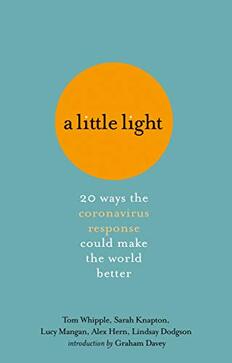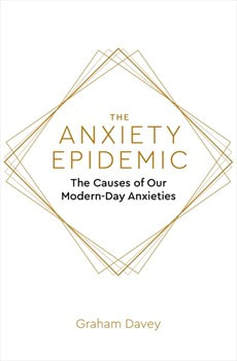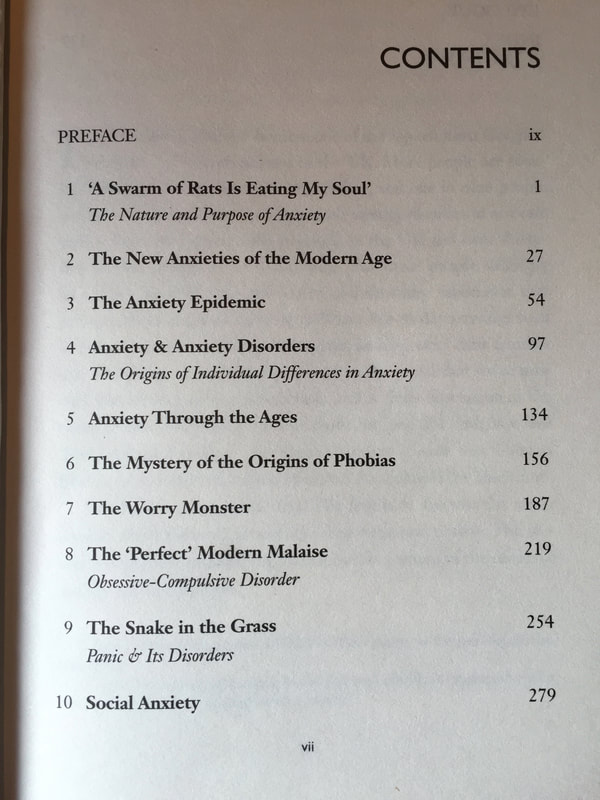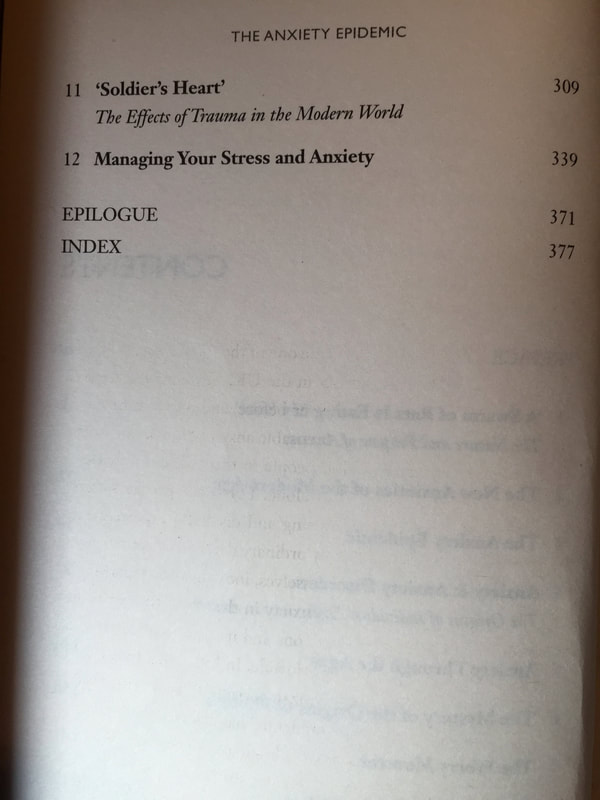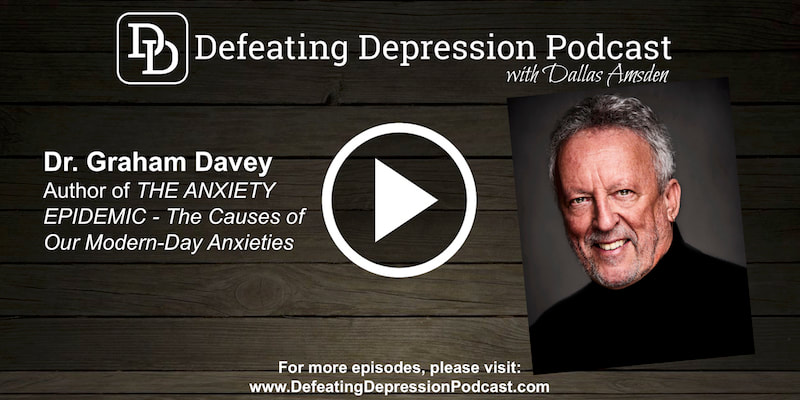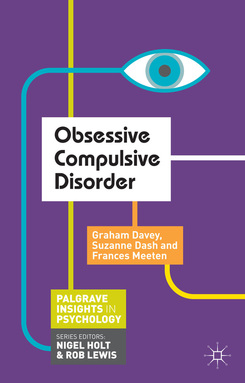My Books

Below are some of the books I've been involved in writing and editing.
You can also find my Amazon profile here
You can also find my Amazon profile here
The Psychology Student's Guide to Study and Employability
Graham Davey
Publishers: SAGE
Published: 28th April 2022
Graham Davey
Publishers: SAGE
Published: 28th April 2022
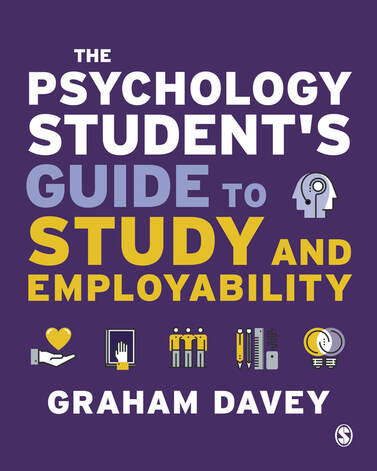
How does a Psychology degree work? Where will it lead me? What skills are employers looking for?
Psychology is one of the most popular undergraduate degree subjects in the UK, which is no surprise given the wide range of transferrable skills it offers. But how to translate these skills into job opportunities? And which career paths to explore? If you are considering studying psychology, or you are already a psychology student looking at your next steps, this book is for you.
Written by leading academics, this handy guide interweaves both study skills and employability skills, providing advice across all three years of your course and talking you through the different options open to you after graduation. From writing essays to revising for exams, and from careers in and outside of professional psychology to further academic study, this book covers everything a psychology student needs to know – even how to make the most of your social life!
Psychology is one of the most popular undergraduate degree subjects in the UK, which is no surprise given the wide range of transferrable skills it offers. But how to translate these skills into job opportunities? And which career paths to explore? If you are considering studying psychology, or you are already a psychology student looking at your next steps, this book is for you.
Written by leading academics, this handy guide interweaves both study skills and employability skills, providing advice across all three years of your course and talking you through the different options open to you after graduation. From writing essays to revising for exams, and from careers in and outside of professional psychology to further academic study, this book covers everything a psychology student needs to know – even how to make the most of your social life!
Psychopathology: Research, Assessment & Treatment in Clinical Psychology - Third Edition
Graham Davey
Publishers: Wiley-Blackwell
Published: 5th August 2021
Graham Davey
Publishers: Wiley-Blackwell
Published: 5th August 2021
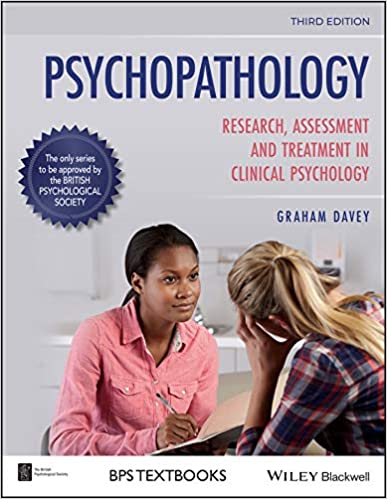
One of the main aims of this third edition was to update the research database in the book, and we’ve included a total of over one thousand one hundred new updated references spread across all seventeen chapters. This enables Psychopathology to act as a source book for students and instructors wanting to access the most recent evidence-based research on the causes and treatments of mental health problems.
There have been many significant developments in the science, treatment and conceptualization of mental health problems over recent years and many of these are represented in this third edition. These developments include the growth in alternative evidence-based approaches to diagnosing and categorizing mental health problems; the surge in research in epigenetics and the possibility that many forms of early experience may moderate the expression of genes in ways that affect mental health symptoms; the continuing advancement of the neurodiversity movement, which promotes the idea that there is not just one “normal” or “healthy” type of brain; the growing importance of network analyses showing how mental health symptoms interact; and the greater understanding of how mental health problems develop out of the socioeconomic conditions in which people live, and are not in any simple way about biological or even psychological dysfunction.
Just like the first and second editions, this third edition is supplemented by a range of features designed to facilitate effective teaching and learning. These include Focus Point Boxes for more in depth discussion of particular topics that are conceptually important or of contemporary interest; Research Methods boxes containing detailed descriptions of methods used in psychopathology research; Case Histories describing the symptoms, experiences and life circumstances encountered by those with lived experience of mental health problems; Client’s Perspective Boxes providing descriptions of the experience of psychopathology; Treatment in Practice Boxes giving detailed insight into how individual treatments are conducted in practice; and Self-Test Questions to test the reader’s knowledge of facts and concepts.
The book also has a companion website providing both learning and teaching resources as well as video material and links to further information about mental health problems.
There have been many significant developments in the science, treatment and conceptualization of mental health problems over recent years and many of these are represented in this third edition. These developments include the growth in alternative evidence-based approaches to diagnosing and categorizing mental health problems; the surge in research in epigenetics and the possibility that many forms of early experience may moderate the expression of genes in ways that affect mental health symptoms; the continuing advancement of the neurodiversity movement, which promotes the idea that there is not just one “normal” or “healthy” type of brain; the growing importance of network analyses showing how mental health symptoms interact; and the greater understanding of how mental health problems develop out of the socioeconomic conditions in which people live, and are not in any simple way about biological or even psychological dysfunction.
Just like the first and second editions, this third edition is supplemented by a range of features designed to facilitate effective teaching and learning. These include Focus Point Boxes for more in depth discussion of particular topics that are conceptually important or of contemporary interest; Research Methods boxes containing detailed descriptions of methods used in psychopathology research; Case Histories describing the symptoms, experiences and life circumstances encountered by those with lived experience of mental health problems; Client’s Perspective Boxes providing descriptions of the experience of psychopathology; Treatment in Practice Boxes giving detailed insight into how individual treatments are conducted in practice; and Self-Test Questions to test the reader’s knowledge of facts and concepts.
The book also has a companion website providing both learning and teaching resources as well as video material and links to further information about mental health problems.
Clinical Psychology - Third Edition
Graham Davey, Nick Lake & Adrian Whittington
Publishers: Routledge
Published 2020
Graham Davey, Nick Lake & Adrian Whittington
Publishers: Routledge
Published 2020
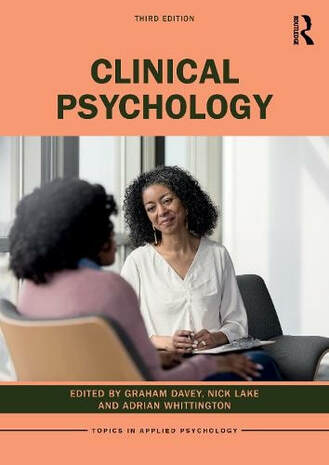
Clinical Psychology, Third Edition offers an introduction to clinical psychology as it is operating on the ground - delivering clinical interventions, supervision, consultation, leadership, training and research, in rapidly changing health and care services. This new edition of Clinical Psychology brings together practitioners, researchers, and people who have used the services of clinical psychologists to explain how clinical psychologists work, the evidence that their work is based on, and how it can change peoples' lives for the better. The book explains the core principles of clinical practice, as well as outlining the role of a clinical psychologist within a healthcare team. It covers issues involved in working with children and families, adult mental health problems, people with disabilities and physical health issues, and the use of neuropsychology. In this fully revised third edition, every chapter has been brought up to date with developments in research and practice, and chapters have been added regarding the important fields of working with autistic people and working with people in forensic mental health services. Given the popularity of clinical psychology for many undergraduate and graduate students, the contents of this text have been designed around teaching and learning features that can be used as the basis for an intermediate or advanced-level course that will allow students to learn both breadth and depth about clinical psychology.
A Little Light: 20 Ways The Coronavirus Could Make The World Better
Graham Davey, Tom Whipple, Sarah Knapton, Sarah Langdon, & 3 More
Publishers: Sphere
Published 2020
Graham Davey, Tom Whipple, Sarah Knapton, Sarah Langdon, & 3 More
Publishers: Sphere
Published 2020
|
At a time of fear and anxiety, leading writers offer reassurance by looking at twenty ways the response to the coronavirus pandemic could make the world a better place.
The coronavirus (Covid-19) pandemic is a once-in-a-century event, a tragedy and a source of deep anxiety. But in darkness there is light; in tackling the most impossible challenges, human ingenuity forges new and positive paths forward. In his introduction, Professor Graham Davey argues that context and perspective are the best ways to alleviate the personal anxiety created by the pandemic and lockdown - context offered by the pieces in this collection. From leading science, society and culture writers and editors comes an easy-to-read look at twenty ways the human response to coronavirus could help to make the world a better place. Twenty reasons for each of us to find light in the darkness. |
The Anxiety Epidemic
Graham Davey
Publishers: Little Brown Books 2018
Graham Davey
Publishers: Little Brown Books 2018
|
Also available as an Audiobook
"In 2014 “what is anxiety?” became one of the top ten most Googled “What is…?” search phrases in the UK. More people are seeking treatment for anxiety than ever before, and one in nine people worldwide will experience a diagnosable anxiety disorder in any one year - that’s over 7 million people in the UK, and over 35 million people in the USA. So prevalent is anxiety in the world that we’re now told that it’s at epidemic proportions, and it rivals depression as the major mental health problem worldwide - ‘the silent epidemic’ seems to have eclipsed the ‘black dog’. This book has two main aims. The first is to describe the many ways in which the modern world creates stress and anxiety – and some of these are unique to the twenty-first century. The second is to provide an engaging and accessible account of the causes of anxiety and its disorders. I started life as an anxious child, developed into an anxious adolescent, and then became an anxious adult, but I have been fortunate enough to spend most of my working lifetime researching anxiety – basically my day job both pays the mortgage and helped me to understand myself! So you’ll be reading plenty of my own anxiety anecdotes along the way as well as some insights into the research we conducted on what anxiety is and how it is that many of us come to suffer it." |
Classic Studies in Clinical Psychology
Graham Davey
Publishers: Sage
Published 2019
Graham Davey
Publishers: Sage
Published 2019
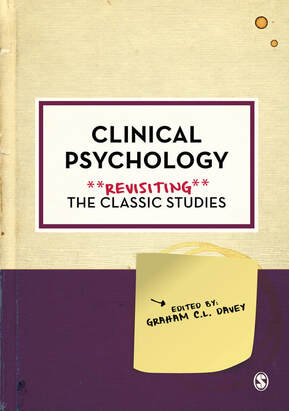
The Sage Revisiting the Classic Studies series is designed to be a student-friendly introduction to some of the formative articles, studies and experiments that have helped shape a particular field of psychology, from Social Psychology through to Neuroscience. The books are short, accessible and affordable with an emphasis on critical thinking and student/reader engagement. While no volume can claim to contain all the definitive classic studies, the point of this Sage series is to highlight what students are most likely to come into contact with in their undergraduate training, particularly in their first years of study.
Psychology
An Introduction to Psychology
Graham Davey
Publishers: Wiley
Published 2018
Imprint: BPS Blackwell
An Introduction to Psychology
Graham Davey
Publishers: Wiley
Published 2018
Imprint: BPS Blackwell
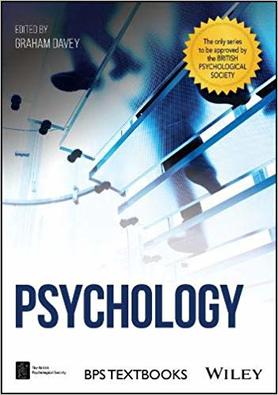
Psychology continues to be one of the most popular fields of study at colleges and universities the world over, and Introduction to Psychology offers a comprehensive overview of the historical, methodological, and conceptual core of modern psychology. This textbook enables students to gain foundational knowledge of psychological investigation, exploring both the biological basis and mental processes underlying our thoughts and behaviors. Officially endorsed by the British Psychological Society, this book covers topics ranging from biological, cognitive and developmental psychology to the psychology of social interactions, psychopathology and mental health treatments. Each chapter provides detailed examination of essential topics, chapter summaries, real-world case studies, descriptions of research methods, and interactive learning activities to strengthen student comprehension and retention.
This textbook offers a wealth of supplementary material for instructors of introductory and advanced undergraduate courses in psychology. An instructor’s manual includes lecture outlines, classroom discussion topics, homework assignments and test bank questions, while online access to additional digital content provides a complete resource to facilitate effective teaching and learning.
Download a provisional list of contents
View Contents & Contributors here
This textbook offers a wealth of supplementary material for instructors of introductory and advanced undergraduate courses in psychology. An instructor’s manual includes lecture outlines, classroom discussion topics, homework assignments and test bank questions, while online access to additional digital content provides a complete resource to facilitate effective teaching and learning.
Download a provisional list of contents
View Contents & Contributors here
Psychopathology: Research Assessment & Treatment in Clinical Psychology
2nd Edition 2014
Graham Davey
2nd Edition 2014
Graham Davey
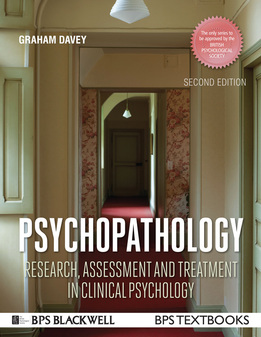
Psychopathology has been designed to provide students with a comprehensive coverage of both psychopathology and clinical practice, including extensive treatment techniques for a range of mental health issues. The text is designed to be accessible to students at a range of different learning levels, from first year undergraduates to post–graduate researchers and those undergoing clinical training. Psychopathology is primarily evidence and research based, with coverage of relevant research from as recently as 2013, making it useful to researchers as well as clinicians. The emphasis in the book is on providing students with a real insight into the nature and experience of mental health problems, both through the written coverage and by providing a range of video material covering personal accounts of mental health problems. The text is integrated with a wide variety of teaching and learning features that will enable facilitators to teach more effectively, and students to learn more comprehensively. Many of these features have been updated for the new edition and new material has been included to reflect the changes in DSM–5. Features include Focus Points that discuss contentious or topical issues in detail, Research Methods boxes showing how clinical psychologists do research on psychopathology, and Case Histories detailing a range of mental health problems. Online resources An all new student website is available at www.wiley–psychopathology.com . The website houses a huge variety of new digital material including more than 50 instructional and supplementary videos covering descriptions of symptoms and aetiologies, examples of diagnosis and diagnostic interviews, recounted personal experiences of people with mental health problems, and discussions and examples of treatment. The site also contains hundreds of new student quizzes, as well as revision flashcards, student learning activities, discussion topics, lists of relevant journal articles (many of which provide free links to relevant articles published in Wiley Blackwell journals), and topics for discussion related to clinical research and clinical practice. A fully updated lecturer test bank has also been developed including over 1,000 questions, as well as suggested essay questions and these can be accessed by instructors on our lecturer book companion site
Read a list of the book's contents here
Read a list of the book's contents here
Clinical Psychology
2nd Edition 2015
Graham Davey, Nick Lake & Adrian Whittington
2nd Edition 2015
Graham Davey, Nick Lake & Adrian Whittington
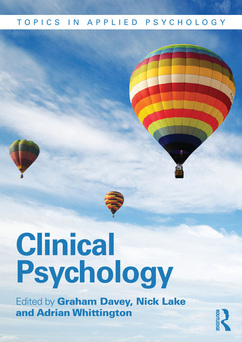
Clinical Psychology, Second Edition offers a comprehensive and an up-to-date introduction to the field. Written by clinical practitioners and researchers, as well as service users who add their personal stories, the book provides a broad and balanced view of contemporary clinical psychology.
This new edition has been extensively revised throughout and includes a new section on working with people with disabilities and physical health problems. It also includes a new chapter on career choices, and help and advice on how to move forward into clinical psychology training.
The book starts by explaining the core elements of what a clinical psychologist does and the principles of clinical practice, as well as outlining the role of the clinical psychologist within a healthcare team. It goes on to cover issues involved with working with children and families, adult mental health problems, working with people with disabilities and physical health problems, and the use of neuropsychology. The final part of the book explores current professional issues in clinical psychology, the history and future of clinical psychology, and career options.
The integrated and interactive approach, combined with the comprehensive coverage, make this book the ideal companion for undergraduate courses in clinical psychology, and anyone interested in a career in this field. It will also be of interest to anyone who wants to learn more about the work of a clinical psychologist, including other healthcare professionals
Read a list of the book's contents here
This new edition has been extensively revised throughout and includes a new section on working with people with disabilities and physical health problems. It also includes a new chapter on career choices, and help and advice on how to move forward into clinical psychology training.
The book starts by explaining the core elements of what a clinical psychologist does and the principles of clinical practice, as well as outlining the role of the clinical psychologist within a healthcare team. It goes on to cover issues involved with working with children and families, adult mental health problems, working with people with disabilities and physical health problems, and the use of neuropsychology. The final part of the book explores current professional issues in clinical psychology, the history and future of clinical psychology, and career options.
The integrated and interactive approach, combined with the comprehensive coverage, make this book the ideal companion for undergraduate courses in clinical psychology, and anyone interested in a career in this field. It will also be of interest to anyone who wants to learn more about the work of a clinical psychologist, including other healthcare professionals
Read a list of the book's contents here
Psychopathology & Abnormal Psychology: Five Volumes
Graham Davey
Publishers: Sage 2015
Sage Benchmarks in Psychology
Graham Davey
Publishers: Sage 2015
Sage Benchmarks in Psychology
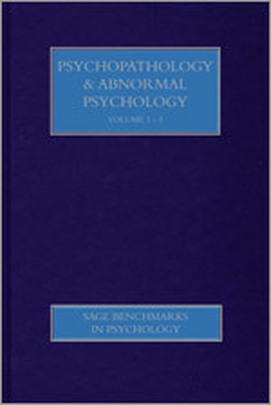
This Major Work provides a structured and comprehensive insight into the areas of psychopathology and abnormal psychology – topics that cover the causes and treatments of mental health problems. This is a notably interdisciplinary field that intersects a number of domains of psychological science including clinical psychology, child psychology, experimental psychology, social psychology and neuropsychology, as well as touching upon other areas of study, such as education. It also forms the knowledge base for professions such as clinical psychology and psychiatry.
This collection’s contents are structured thematically and each of the five volumes is dedicated to an important area of psychopathology or abnormal psychology. Additionally, each volume includes an introduction written by the work’s acclaimed editor, Graham C. Davey, which maps out the volume’s structure and highlights the significance of each article and the how the subject matter in that area has developed.
Volume One: Conceptual Issues, Classification & Assessment
Volume Two: Anxiety, Mood & Trauma-Related Disorders
Volume Three: Psychosis & Personality Disorders
Volume Four: Substance Dependency & Eating Disorders
Volume Five: The Treatment of Psychopathology
This collection’s contents are structured thematically and each of the five volumes is dedicated to an important area of psychopathology or abnormal psychology. Additionally, each volume includes an introduction written by the work’s acclaimed editor, Graham C. Davey, which maps out the volume’s structure and highlights the significance of each article and the how the subject matter in that area has developed.
Volume One: Conceptual Issues, Classification & Assessment
Volume Two: Anxiety, Mood & Trauma-Related Disorders
Volume Three: Psychosis & Personality Disorders
Volume Four: Substance Dependency & Eating Disorders
Volume Five: The Treatment of Psychopathology
Obsessive Compulsive Disorder
Graham Davey, Suzanne Dash, Frances Meeten
Graham Davey, Suzanne Dash, Frances Meeten
|
Obsessive compulsive disorder is a disabling and distressing mental health problem. This accessible introduction examines OCD's causes, symptoms, diagnosis and treatment, and is richly illustrated with case studies, making it engaging reading for anyone wishing to understand this complex mental health problem.
Read a list of the book's contents here The Palgrave Insights in Psychology series provides short, readable introductions to a range of central issues and topics across the field of psychology. Written to be authoritative, accessible and affordable, these books appeal to a wide range of students by providing clear, up-to-date coverage in a manageable format. |
Psychopathology: Research, Assessment & Treatment in Clinical Psychology
Graham Davey
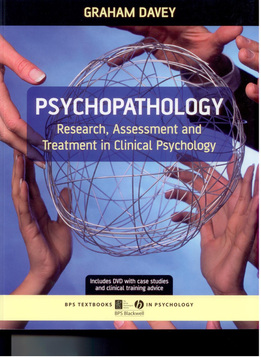
Psychopathology is a comprehensive introductory textbook covering all facets of psychopathology and clinical practice for students at all levels that is supplemented by a wide range of features to facilitate effective teaching and learning. The text′s accessible format and case study approach provide a valuable opportunity to understand how a broad range of diagnoses are reached in clinical settings. There is a fully comprehensive website with resources for students and lecturers available. Psychopathology facilitates more effective teaching and learning by including highlighted boxes throughout the text for more in–depth coverage. The book includes a DVD of patient interviews to be viewed in conjunction with the text and an introduction to clinical psychology training for students interested in pursuing a career in the field. The book features case studies, questions, further reading advice and exercises and offers more learning and teaching opportunities than existing texts.
Read a list of the book's contents here.
"Graham Davey has produced a comprehensive and eminently accessible work that provides a rich and unrivalled grounding in the theory and methods of abnormal psychology whilst covering the major diagnostic categories. Unique in its coverage of experimental psychopathology which is blended with clinical psychology it is an indispensable resource for undergraduate students and their teachers. The book is backed by audio-visual resources and links to key published articles making it one of the most useful and informative texts at this level."
Adrian Wells, Professor of Clinical and Experimental Psychopathology
University of Manchester
Read a list of the book's contents here.
"Graham Davey has produced a comprehensive and eminently accessible work that provides a rich and unrivalled grounding in the theory and methods of abnormal psychology whilst covering the major diagnostic categories. Unique in its coverage of experimental psychopathology which is blended with clinical psychology it is an indispensable resource for undergraduate students and their teachers. The book is backed by audio-visual resources and links to key published articles making it one of the most useful and informative texts at this level."
Adrian Wells, Professor of Clinical and Experimental Psychopathology
University of Manchester
Managing Anxiety with CBT For Dummies
Graham Davey, Kate Cavanagh, Fergal Jones, Lydia Turner, Adrian Whittington
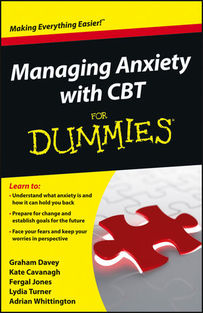
Don′t panic! Combat your worries and minimize anxiety with CBT! Cognitive Behavioural Therapy (CBT) is a hugely popular self–help technique, which teaches you to break free from destructive or negative behaviors and make positive changes to both your thoughts and your actions. This practical guide to managing anxiety with CBT will help you understand your anxiety, identify solutions to your problems, and maintain your gains and avoid relapse. Managing Anxiety with CBT For Dummies is a practical guide to using CBT to face your fears and overcome anxiety and persistent, irrational worries. You′ll discover how to put extreme thinking into perspective and challenge negative, anxiety–inducing thoughts with a range of effective CBT techniques to help you enjoy a calmer, happier life. Helps you understand anxiety and how CBT can help Guides you in making change and setting goals Gives you tried–and–true CBT techniques to face your fears and keep a realistic perspective Managing Anxiety with CBT For Dummies gives you the tools you need to overcome anxiety and expand your horizons for a healthy, balanced life.
Read a list of the book's contents here
"Inevitably, these things are very personal but if you are familiar with the series from any other book and the tone and pace of that text worked for you, this one should have something for you too. A difficult and complicated subject handled with clarity and sensitivity." Amazon Customer Review
Read a list of the book's contents here
"Inevitably, these things are very personal but if you are familiar with the series from any other book and the tone and pace of that text worked for you, this one should have something for you too. A difficult and complicated subject handled with clarity and sensitivity." Amazon Customer Review
Applied Psychology
Graham Davey
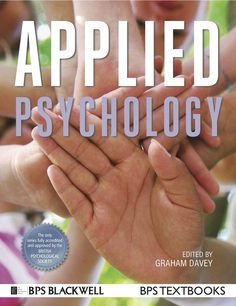
Applied Psychology is designed to introduce students to the main areas of applied psychology (Clinical Psychology, Health Psychology, Educational Psychology, Occupational Psychology, Forensic Psychology, Sports & Exercise Psychology, Counselling Psychology and Teaching Psychology) from UK, European and international perspectives. It also introduces the core psychological knowledge that underpins these applied and professional areas. As a result, students learn core knowledge from the five main areas of psychology, as well as acquiring a thorough grounding in how this knowledge is applied, and the professional issues associated with that application.
Read a list of the book's contents here.
“This applied psychology text by Prof. Davey is outstanding, highlighting the main fields of clinical, health, forensic, educational, occupational and sports psychology. He provides the reader with the most up-to-date research, theories and practice in these applied occupations. This is a must read for anyone wanting to pursue a career in any of these areas, you will enjoy it and you will learn a great deal from it.”
Prof. Cary L. Cooper, CBE, Distinguished Professor of Organizational Psychology and Health at Lancaster University Management School
Read a list of the book's contents here.
“This applied psychology text by Prof. Davey is outstanding, highlighting the main fields of clinical, health, forensic, educational, occupational and sports psychology. He provides the reader with the most up-to-date research, theories and practice in these applied occupations. This is a must read for anyone wanting to pursue a career in any of these areas, you will enjoy it and you will learn a great deal from it.”
Prof. Cary L. Cooper, CBE, Distinguished Professor of Organizational Psychology and Health at Lancaster University Management School
Clinical Psychology
Graham Davey
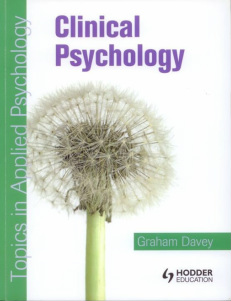
Clinical Psychology provides an overview of both the academic and professional aspects of the field. The book is split into five clear sections: background, working with children and families, adult mental health, clinical neuropsychology and learning disabilities. Section one answers the question 'what is clinical psychology?', explains the general principles of clinical practice and outlines the structure of current mental health service provision. Section two covers mental health issues involving work with children and families, such as childhood anxiety and depression and autistic spectrum disorders. Section three looks at adult mental health problems, such as anxiety, eating and personality disorders, depression, psychosis and its treatment. Sections four and five treat clinical neuropsychology and learning disabilities.
Evidence-based research is included throughout to provide a balanced view of current theories addressing the origins of psychopathology, and treatments and interventions are evaluated to provide a broad and balanced view of the field.
Read a list of the book's contents here.
Evidence-based research is included throughout to provide a balanced view of current theories addressing the origins of psychopathology, and treatments and interventions are evaluated to provide a broad and balanced view of the field.
Read a list of the book's contents here.
Complete Psychology
Graham Davey, David Messer, Christopher Sterling, Ian P Albery, Chris Chandler, Simon Moore, Dai Jones, Andy Field
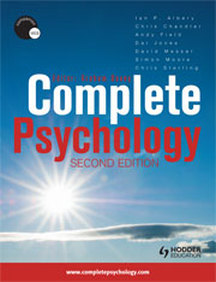
The new edition of Complete Psychology is the definitive undergraduate textbook. It not only fits exactly with the very latest BPS curriculum and offers integrated web support for students and lecturers, but it also includes guidance on study skills, research methods, statistics and careers. Each chapter has been fully updated to reflect changes in the field and to include examples of psychology in applied settings, and further reading sections have been expanded. The companion website, has also been fully revised and now contains chapter summaries, author pages, downloadable presentations, useful web links, multiple choice questions, essay questions and an electronic glossary. Written by an experienced and respected team of authors, this highly accessible, comprehensive text is illustrated in full colour, and quite simply covers everything students need for their first-year studies as well as being an invaluable reference and revision tool for second and third years.
Read a list of the book's contents here.
"This book is essential for first year undergrads studying any kind of psychology course. The easy to understand text and diagrams are fun and informative, and at a level that requires no prior knowledge of psychology. Each chapter also gives a list of further suggested reading at the end, which is helpful when undertaking research. Must read!" Amazon Customer Review
Read a list of the book's contents here.
"This book is essential for first year undergrads studying any kind of psychology course. The easy to understand text and diagrams are fun and informative, and at a level that requires no prior knowledge of psychology. Each chapter also gives a list of further suggested reading at the end, which is helpful when undertaking research. Must read!" Amazon Customer Review
Worry and its Psychological Disorders: Theory, Assessment & Treatment
Graham Davey, Adrian Wells
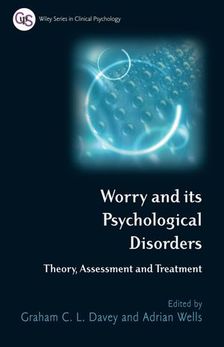
Anxiety–based disorders are among the most common mental health problems experienced in the population today. Worry is a prominent feature of most anxiety–based disorders including generalized anxiety disorder, specific phobias, obsessive–compulsive disorder, panic disorder, and post–traumatic stress disorder. Written by international experts, Worry and its Psychological Disorders offers an up–to–date and complete overview of worry in a single volume. Divided into four sections, the book explores the nature of worry, the assessment of worry, contemporary theories of chronic and pathological worry, and the most recently developed treatment methods. It includes in–depth reviews of new assessment instruments and covers treatment methods such as Cognitive Behavioural Therapy and Metacognitive Therapy. Useful case studies are also included. This important volume provides an invaluable resource for clinical practitioners and researchers. It will also be of relevance to those studying clinical or abnormal psychology at advanced level.
Read a list of the book's contents here.
"The book is a goldmine of information and is strongly recommended to all counselling professionals who are informed of or interested in the clinical field of behaviour modification" ( Studia Historiae Ecclesiasticae , April 2008) "...wealth of information..." ( Human Givens , June 2006)
Read a list of the book's contents here.
"The book is a goldmine of information and is strongly recommended to all counselling professionals who are informed of or interested in the clinical field of behaviour modification" ( Studia Historiae Ecclesiasticae , April 2008) "...wealth of information..." ( Human Givens , June 2006)
Encyclopaedic Dictionary of Psychology
Graham Davey

Psychology is a fascinating subject which attracts much interest from both students and the general public. It covers the whole span of human activity from childhood development, to the study of the elusive concept of consciousness to disorders, such as those based around anxiety, mood and eating. The scientific study of psychology also requires an understanding of research methods and conceptual issues. The Encyclopaedic Dictionary of Psychology addresses all these issues and more, and is a core reference for any student of psychology. It is authoritative and accessible, and covers the basic curriculum content of a degree course along with more specialised material in areas of widespread interest. The Encyclopaedic Dictionary presents more than 1500 different entries grouped into 8 thematic topic areas, and on a range of levels from brief definitions to more substantial discussions which allow the reader to obtain a fuller grasp of important terms and concepts. For key issues, the explanation is supported with illustrations, tables and photographs, and relevant contemporary references are provided throughout to allow the reader to pursue more widely their particular interests. The book is comprehensively cross-referenced for ease of use.
Phobias: A Handbook of Theory, Research & Treatment
Graham Davey
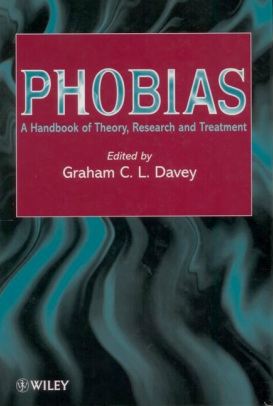
Phobias: A Handbook of Theory, Research and Treatment Edited by Graham C. L. Davey University of Sussex, UK ∗ A complete summary of current knowledge about phobias, for the academic and clinician ∗ First comprehensive handbook on the topic for 10 years ∗ The latest research and findings presented in a single source ∗ Contributions from eminent international clinicians and researchers Psychological treatments available for specific phobias have been refined considerably in recent years. This extensive handbook acknowledges these treatments and includes the description and nature of prevalent phobias, details of symptoms, prevalence rates, individual case histories, and a brief review of our knowledge of the aetiology of phobias. Key knowledge about phobias is brought together in this one critical and accessible handbook, which saves the busy clinician time and provides an authoritative guide to the literature. It is systematically compiled to act as a working tool providing an integrated, contemporary account of prevalent specific phobias, their treatment and theoretical issues concerning aetiology. The Handbook also reflects the important role of cognitive factors in psychopathology which generate and maintain phobic disorders, a process that is now recognized as important in their understanding and treatment.
Read a list of the book's contents here.
"The joy of Davey′s book is that it skillfully blends the historical conditioning theory perspective with current cognitive–behaviour theories . the result is a complete summary of current knowledge about phobias, for clinicians and researchers . an invaluable handbook and an essential summary of the status of theory, research and treatment in phobias. It is highly recommended to researchers and to both novice and experienced clinicians." Roz Shafran, Behaviour Research and Therapy
Read a list of the book's contents here.
"The joy of Davey′s book is that it skillfully blends the historical conditioning theory perspective with current cognitive–behaviour theories . the result is a complete summary of current knowledge about phobias, for clinicians and researchers . an invaluable handbook and an essential summary of the status of theory, research and treatment in phobias. It is highly recommended to researchers and to both novice and experienced clinicians." Roz Shafran, Behaviour Research and Therapy
